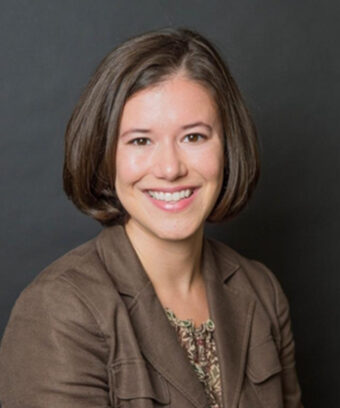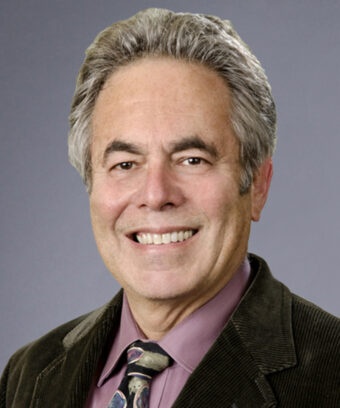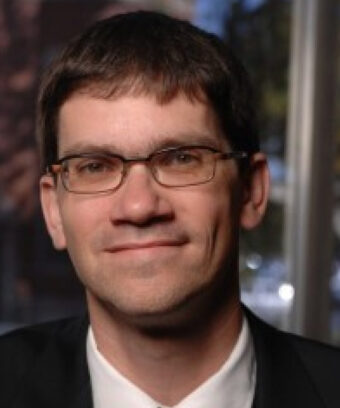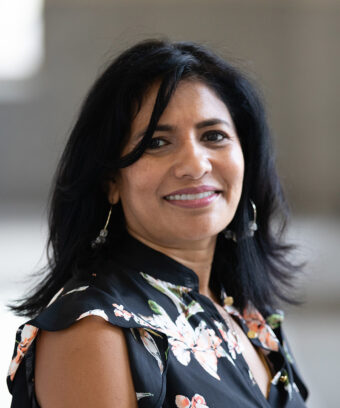Diagnosing Threats to Democracy
What are the most important challenges to democracy today? Signs of democratic decline seem to pervade much of the West, including economic challenges, increased polarization, and lack of trust in democratic institutions. We asked a group of political scientists, including Sarah Bush, Maria Debre, Bianca Freeman, Peter Gourevitch, Mark Hallerberg, Anna Meyerrose, Jon Pevehouse, and Nita Rudra, to diagnose the problem and offer solutions.
These and other social scientists participated in a May 2022 workshop hosted by IGCC’s Future of Democracy initiative.

Sarah Bush
A key threat to democracy in many countries, including the United States, is the erosion of public trust in elections and democratic institutions more broadly. I am not sure that this is the biggest threat to democracy today, but it is certainly a big one. Whether the public believes elections are trustworthy affects whether they accept the political system and their decisions about how to participate in politics in terms of voting, protesting, and more. With the violent insurrection at the U.S. Capitol in January 2021, Americans unfortunately saw first-hand the dangerous events that can be unleashed when politicians try to undermine the legitimacy of democratic elections.
There are several challenges when it comes to public trust in elections and democracy today. One is the phenomenon we’ve seen in the United States: political actors may try to undermine the individuals’ confidence in genuine democratic elections for their own gain. Another is more characteristic of partially- and non-democratic countries that despite their lack of political freedom still hold elections: politicians take steps to try to convince the public that flawed elections are actually fair. They can do this by manipulating elections in subtle and difficult-to-detect ways or by inviting so-called “zombie” election observers that endorse their elections despite the obvious limitations.
In my forthcoming book with Lauren Prather, Monitors and Meddlers: How Foreign Actors Influence Local Trust in Elections, we consider how citizens form their beliefs about election credibility. Our research suggests ways that democracies can respond to the challenges of electoral trust at home and abroad. In particular, they should attempt to amplify high-quality information about election credibility. Doing so may mean funding and supporting professional election observers. It may also mean publicizing the activities and positive characteristics of professional observers that are already present at many countries’ elections.
Sarah Bush is an associate professor at Yale University.

Maria Debre
As a scholar of international organizations, two interrelated developments make me particularly uneasy. First, authoritarian regimes have captured regional institutions that were once the sites of post-colonial nation-building. By now, these institutions have turned into full-blown “Clubs of Autocrats” that have had a helping hand in defending autocratic regimes from pro-democratic protestors, in co-opting political elites, in legitimizing flawed elections, and in shielding against the fallout from international sanctions. Regional organizations have played a significant role in supporting the Chinese regime build-up one of the most advanced modern repression machineries against Uighur Muslims in Xinjiang, in helping aging dictators in Sub-Saharan Africa withstand coups and claim victory at the ballot box, and protecting populist forces in Latin America while they rebuild autocratic regimes.
But autocrats do not stop at regional borders. The complacency and retreat of democratic member states in international organizations has left a void that has enabled autocrats to advance their agendas on a global level. As of now, international organizations seem to be weathering the storm. None have lost democratic majorities or their overall democratic identity to authoritarian coalitions—yet. But autocrats are also skilled at flying under the radar and using informal coalitions and influence to achieve their goals. Leaders of authoritarian regimes have rallied varying coalitions of fellow autocrats and backsliders in informal groupings like the so-called “Like-minded Group,” the “Group of Friends in Defense of the UN Charter,” and the EU “Visegrad Group” to pre-negotiate positions, increase bargaining power, and pass resolutions. These coalitions have managed to successfully challenge the protection of human rights at the United Nations Human Rights Council, to prevent critical non-governmental organizations from receiving consultative status at the United Nations, or to insulate themselves from sanctions and rule of law procedures.
Although organizations can be captured, I still have deep trust in the resilience of multilateral institutions to save the day. But democratic survival is not automatic. Institutions must be equipped with necessary resources to fight these battles and they need qualified and motivated staff that can strategically respond to challenges. They also need committed member states that are willing to use their clout to build coalitions to safeguard democracy and, where necessary, make tough concessions.
Living in Berlin, the Russian invasion of Ukraine has rattled me deeply. Seeing thousands of refugees arrive at the train station due to the decision of an imperialistic dictator seems like a story fallen out of time. And still, it was not necessarily surprising. We saw the same pictures not even ten years ago with Syrian refugees fleeing their home state and arriving in Germany because of the actions of that same dictator who supplied weapons and support to the Assad regime. But this time around, there is a meaningful response by Western democracies: an unprecedented sanctions regime, renewed security cooperation in Europe, a united stance in and by international organizations.
This may not mean that we are seeing a fast removal of Putin or an end to transnational cooperation of dictators in the near future. But the reactions have certainly been a strong signal that democracy, liberalism, and peace are values that will and can be defended internationally.
Maria Debre is a lecturer and postdoctoral researcher at Potsdam University, and an associate researcher in the ERC project “Decline and Death of International Organizations” at Maastricht University.

Bianca Freeman
Efforts to strengthen democracy must account for the racial dynamics that make it vulnerable to decay. The United States needs to embrace the end of state-sanctioned violence against minoritized communities, a violation that erodes legitimacy of its institutions. Systemic racism also breeds opportunity for far-right political movements that seek to challenge democratic consensus. The onus of democracy is not ours alone, however. Aspirations for a democratic world order are more credible when Western governments hold themselves accountable to the standards of democracy for which they advocate externally to non-democratic counterparts. Today, unprecedented mobilization across communities around the globe is helping to shore up democracy along critical dimensions such as human rights and voting rights.
Race underscores democratic backlash in important ways. The rise of far-right politics is concomitant with movements for racial justice and events like the murder of George Floyd. Both trends illuminate the shortcomings of U.S. democracy itself. Black Lives Matter and similar campaigns in democratic societies around the world remind us that law and enforcement are often biased by racism. This institutional feature cannot exist without widespread prejudice, unconscious or otherwise.
Moving forward, expertise on racial politics in domestic and international contexts—from study, practice, activism, or other lived experience—will remain key for evaluating democratic performance now and in the future.
Bianca Freeman is an IGCC dissertation fellow and a PhD candidate in the Department of Political Science at UC San Diego.

Peter Gourevitch
Democracy in the U.S. appears in crisis. The essence of democracy lies in the orderly transfer of power to a legitimately chosen successor. Yet, a large number of Americans question whether the presidential election of 2020 was legitimately conducted. They confuse dislike of the outcome on substantive grounds with procedural legitimacy. When “fair in process” and “fair in outcome” are too deeply questioned, democracy is in serious difficulty.
Among our professional colleagues in political science there seems to be some disagreement over the depth of this crisis. Comparativists and international relations (IR) specialists seem more alarmed than Americanists, though there is no strong proof of this allegation. To comparativists the American situation sounds familiar and alarming. They have seen it in other places, often leading to bad outcomes. IR people see bad consequences for American interests in U.S. in foreign policy and U.S. security concerns. In explaining political outcomes, the non-Americanists take more seriously variables such as the Armed Forces, social movements, elite formations, and dissident militants as they see them at work in other countries. Conversely, Americanists say things have been working out, so the worry may be exaggerated.
Even among people who agree something serious is taking place in the U.S. and elsewhere, there is wide-ranging debate over why it is happening. Some focus on the personality of Trump, his ability to attract attention, curiosity. This distracts us, in my view, from exploring the reasons for that attraction. Why do they follow him? It is said people like the defiant tone he emits? But he is not defiant at random. He is critical of certain people and groups: minorities, immigrants, most notably. We must wonder why people want those groups to be criticized, why they feel some kind of appreciation for having negative things said about specific people?
The very fine book by Levitsky and ZIblatt, How Democracies Die, speaks of democracies being in trouble when the leaders do not defend the guardrails—by which they mean the key institutions of constitutional government, election protections, procedures for picking winners, civil liberties, and free speech. This is a good start but by itself it is a description, not an explanation. Why are the guard rails not being protected?
This happens because leaders and people want something else. They have political goals more important to them than the guardrails of democracy. McCarthy of the House of Representatives denounced Trump after the January 6 coup attempt, as did McConnell of the Senate, but both backed away when they saw they might pay a cost among their GOP electorate, which seemed more important to them. Liz Cheney did not agree and stuck to her principles. She may be defeated in the primary of 2022.
The argument in the U.S. and Europe over populism raises the issue of whether it should be understood as a response to economic dislocation—the loss of jobs and economic insecurity—or cultural dislocation: a dislocation from the cultural center of national life by the intrusion of immigrants, gays, women. It is perhaps best seen as an interaction of the two—people in an economically precarious situation are likely to become more responsive to a type of blame which looks for some kind of “other” to treat as the cause of their precarity rather than modernization, technological unemployment, lack of education. Various economic forces at work discourage them from blaming the rich, one of their logical options.
Countries with stronger welfare states have somewhat weaker populist political response, but only partly, as the anger is great wherever there is both economic dislocation and considerable immigration and social change.
The patterns are familiar ones: Cultural disruption mixed with economic change is as old as industrial development, international trade, and democracy. Cultural targets are stimulated by economic conditions. These generates targets to blame. We have seen it throughout the history of modern societies. Democracies have shown vulnerabilities. We have seen it where national states have come into being and where democracies have been developed.
Peter Gourevitch is the founding dean and distinguished professor emeritus of the School of Global Policy and Strategy at UC San Diego.

Mark Hallerberg
As a political economist, I am concerned about the increasing polarization of politics in many democracies, and in the U.S. in particular, and what this implies for the quality of policy in such countries.
To understand the link between polarization and the quality of policy, I would like to introduce what is a classic model of politics. It assumes that voters assess the policies of incumbents. If they approve of them, they re-elect the incumbents. If they disapprove, then they vote for the opposition. There are more nuanced versions of this argument, which include the opposition’s policies, whether voters look backward or forward, or whether voters benchmark the performance of incumbents relative to performance in other countries. But the core insight is the same. Voters sanction incompetent governments and reward competent ones.
Now say voters care only about how their “tribe” does in elections. Political performance, and the public policies behind that performance, get lost. Governments have incentives to appeal only to their base voters, who are more likely to turn out to vote the more they focus on tribal battles. Competence becomes less important to voters, and to politicians.
This is bad for a few reasons. Obviously, it leads to worse policy, which means that a government is not helping its citizens as it should. But this also stokes cynicism not just in the ability of the incumbent but in the political system itself. Systems that create governments that continually under-perform are more likely to spur action to replace the system itself, that is, action to replace a democracy with an autocrat who claims only he (and usually it is a “he”) can “unite the country” and end bad performance that, he proudly announces, arises from the policies the “other” tribe put in place when it had political power. Such moves can come from the political left, but the populists one hears from today who make this argument seem to come mostly (though not exclusively) from the political right.
There are some possible rebuttals to this argument. One could argue that tribal politics has a long history in democracies. The left has fought the right, with fears about what might happen if the “other” tribe wins in other periods of time. Obvious reference points in time are the 1930s and again in the 1950s.
One could also rebut this concern about the inability of electorates to sanction incompetent governments by arguing that elections are close and, even if most people become tribal, a small minority in the middle will still vote on competence, and still decide elections.
On the first, that democracy has been under threat before is not reassuring. In fact, in both periods autocracies replaced democracies. Think, for example, of the spread of fascism in the 1930s and the end of democracy through much of Latin America respectively not just in the 1950s but into the 1960s as well.
On the second, it is not clear anymore that it is better for an incumbent politician to appeal to this decisive “middle” than to the base in a polarized society. Just to take an example from current American politics. A moderate voter may agree that background checks for gun purchases is a good idea, and even many Republican voters may agree. Yet in a tribalized society no Republican will vote for a Democrat who proposes this legislation, and the base of the party will kill off anyone on their side of the aisle who proposes the same thing even if a majority of Republican voters support such a policy. The Republican party won’t offer this middle road to moderates to win the next election.
So outcomes may continue to get worse because the policies do not address the existing problems.
How does one break out of this cycle? The dynamic I describe is especially problematic in political systems whose electoral systems encourage the dominance of two parties, such as “first past the post,” and in systems that are presidential instead of parliamentary. The United States has both attributes. I am pessimistic that any real change in such institutions is possible. Perhaps the saving grace could be American federalism. When things are blocked at the federal level there may be movement in the states. But such effects will be uneven, and disillusionment with the political system may grow.
Mark Hallerberg is the Dean of Faculty and Research and Professor of Public Management and Political Economy at The Hertie School.

Anna M. Meyerrose
Total autocratic reversions have recently fallen by the wayside, with leaders instead favoring more subtle tactics to maintain power. Democratic backsliding is a historically new phenomenon whereby democratically elected officials systematically dismantle liberal democratic institutions yet maintain the veneer of democracy by continuing to hold nominally free and fair elections. As more countries join a cohort of increasingly illiberal semi-democratic and semi-autocratic states, it is at this point uncontroversial to say that democracy is in decline globally.
When I first began studying democratic backsliding in 2015, my focus—and that of others at the time—was on new, primarily third wave democracies. Backsliding in Hungary, Venezuela, Turkey, and the Philippines, although concerning, was at the very least something we could explain. These were new democracies with under-developed institutions more susceptible to manipulation by elected officials. At the time, it was unthinkable that similar processes could unfold in mature, consolidated democracies in western Europe and North America. And to some extent, that has remained the case, though the last seven years have increasingly challenged this notion that democracy is unequivocally “safe” anywhere. The United States has seen elected officials attempt to undermine core democratic institutions, though with (so far) limited success. In France, the far-right populist National Rally party has been a strong contender in the last three presidential elections, and growing levels of polarization in Germany and other western European democracies have raised additional alarms among democracy observers and scholars.
The causes of and corresponding solutions to backsliding in both new and mature democracies are unquestionably complex and multifaceted, so here I highlight one aspect in particular: political parties. Parties, in addition to elections, are at the core of representative democracy: they serve as a link between citizens and the state and are responsible for translating voters’ interests into policy outputs. However, hyper-globalization and extensive economic integration have made it increasingly difficult for parties to offer their constituents viable policy alternatives to the economic status quo. As a result, we have seen parties in a range of democracies that are unable to adequately represent voters’ interests converging toward a neoliberal economic agenda, with distinctions between the center left and center right becoming increasingly difficult to discern.
The collapse of the political center in both new and mature democracies has several consequences. Unable to provide distinct policy platforms, these parties fail to fulfill their core representative functions. This, in turn, fuels citizen disenchantment with democracy, making populism and its corresponding identity-based appeals a more attractive alternative for voters on election day. Once in power, these populists are often at the forefront of dismantling institutions in backsliding states. When they attempt this in the context of a weakened party system, they are less likely to face resistance or a viable opposition. All these factors converge to make backsliding more likely. As such, any efforts to reverse the current global democratic recession must incorporate tactics to promote and support robust, ideologically based political parties with strong ties to their voters.
Anna M. Meyerrose is a postdoctoral research fellow at the Niehaus Center for Globalization & Governance at Princeton University, and an incoming assistant professor of the School of Politics and Global Studies at Arizona State University.

Jon Pevehouse
Democracy is facing significant challenges within the United States and across the globe. Some of these challenges are specific to the U.S., while others are unique to the international arena. For me, two stand out: rising income inequality and the rise of authoritarian influencers in the international arena. I am no expert on the sources of income inequality in the U.S. or across the globe, but by my reading this is a significant driver of the anti-democratic political movements, including populism, that have grown over the past decade. One of the challenges our field faces is untangling cause from consequence. I believe income inequality has given rise to a number of political phenomena—ideological polarization, resentment, vulnerability to misinformation. We too often think of these as causes themselves, rather than as deeper consequences of income inequality.
Authoritarian influencers are a key concern at the international level. Even before the end of the Cold War, when the third wave of democratization began, large authoritarian countries were viewed mostly as pariah states and were isolated from the world economy. As the Cold War ended, democracy seemed to be the only game in town, with the major non-democratic states (think China) still on the margins. But now over 30 years later, these non-democracies are central to the global economy and global politics. And while some of these authoritarian states are more interested than others at spreading their model of governance, those states have resources and political power they did not have during the Cold War.
In addition, given geopolitical changes including the rise of China, Russia’s invasion of Ukraine, and Iran’s drive to develop nuclear weapons, security concerns are again being allowed to trump concerns over democracy. Human rights may be sacrificed at the altar of power politics.
Ideally, the United States and our allies can meet these geopolitical challenges and turn back the rising threats to democracy, while also strengthening democracy at home. This will be no easy task and it will force the U.S. to make hard decisions such as whether to turn a blind eye to human rights abuses and oppression in cases where security interests are significant.
One strategy to meet these challenges is to strengthen U.S. cooperation with, and coordination within, international and regional organizations. These organizations can help promote and protect democracy globally, even if the U.S. makes different choices with countries bilaterally. One lesson from the end of the Cold War was that international organizations can provide significant support to pro-democracy and pro-human rights constituencies in countries to help bolster democracy—even in the face of authoritarian influencers. Moreover, these organizations are often viewed more favorably in countries than are the U.S. or our allies and they can be effective at promoting development to address income inequality.
It will not be easy—authoritarian states have learned their lessons and have limited international organization (IO) and nongovernmental organization access, especially during times of crisis. But with strong financial and rhetorical backing, IOs can be an important tool for the West in promoting and protecting democracy.
Jon Pevehouse is the Vilas Distinguished Professor of Political Science and International Relations at the University of Wisconsin-Madison.

Nita Rudra
How do we increase confidence in domestic political institutions? As a doctoral student with a Marxist bent, I viewed institutions suspiciously. Existing institutions were instruments of the wealthy and business elites who supported policies benefitting them at the cost of the many have-nots. This view shifted as my research evolved. I began to observe the existence of certain domestic political institutions (e.g., democracy, some media, some conflict-mediating institutions), depending on time and space, as central to mediating different interests.
Current events have shaken faith in institutions that uphold democracy for masses of people across the ideological spectrum, albeit for differing reasons. Democratic backsliding, disinformation, rising inequality, racist processes and outcomes are just examples of forces that are challenging potentially functional institutions. Even in the presence of good policies, politics, and institutions, large firms are finding ways around them. Digital advances in information and communication technology have precipitated the spread of global supply chains and greatly enhanced the ability of multinational corporations to avoid domestic regulations—such as environment and labor policies—that protect vulnerable groups. These forces are also inhibiting the effectiveness of labor and welfare policies by increasing international competition for—and the mobility of—capital, thereby weakening domestic regulatory regimes and reducing corporate taxes.
We need stronger mediating institutions—like labor unions—greater political participation by vulnerable groups, and policies to disincentivize nativism, to ensure that the gains from globalization are more evenly spread, and the left-behind do not resort to nativism and identity politics. The only sustainable way forward is shared prosperity—growth that is inclusive—so that the gains from globalization are widespread. But this leaves us in a conundrum: domestic institutions are critical for creating the conditions of shared prosperity and shared prosperity is critical for stronger domestic institutions. We need thoughtful theoretical and empirical research to identify the local/regional/national conditions under which shared prosperity has been fundamental to sustainable globalization. Both economic elites and non-elites will then be better informed and politically motivated to support “good policies” that benefit the majority and not just the few.
Nita Rudra is a professor of government at Georgetown University.

Global Policy At A Glance
Global Policy At A Glance is IGCC’s blog, which brings research from our network of scholars to engaged audiences outside of academia.
Read More